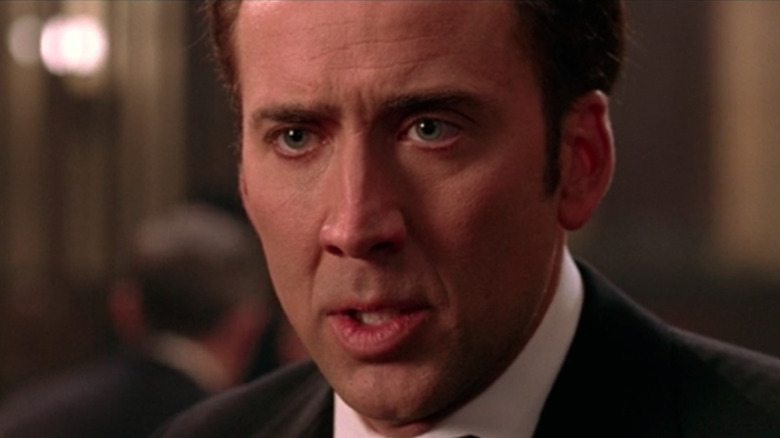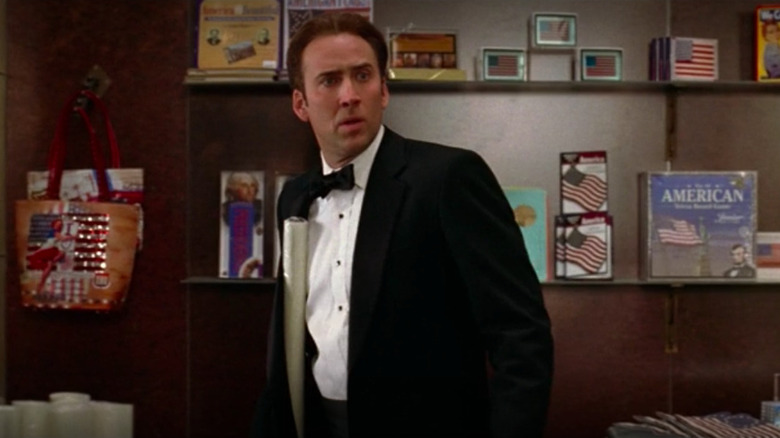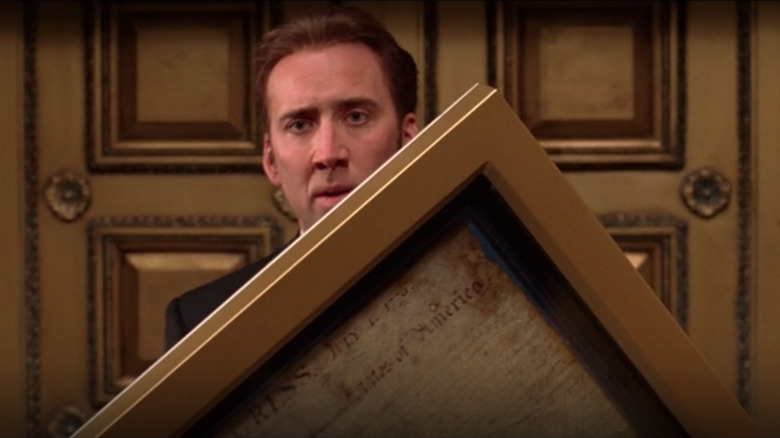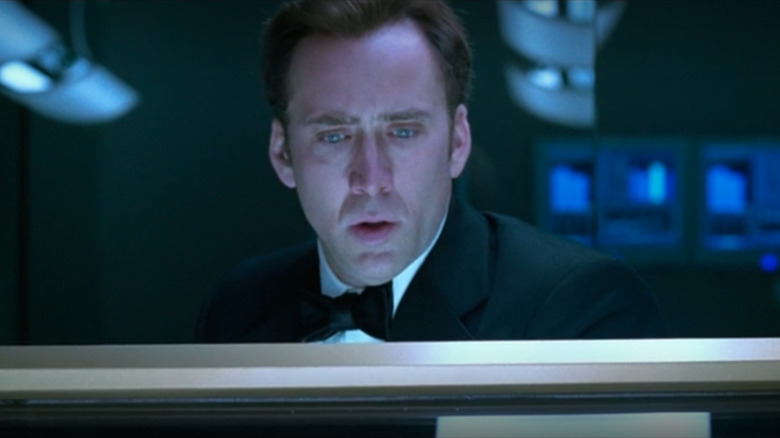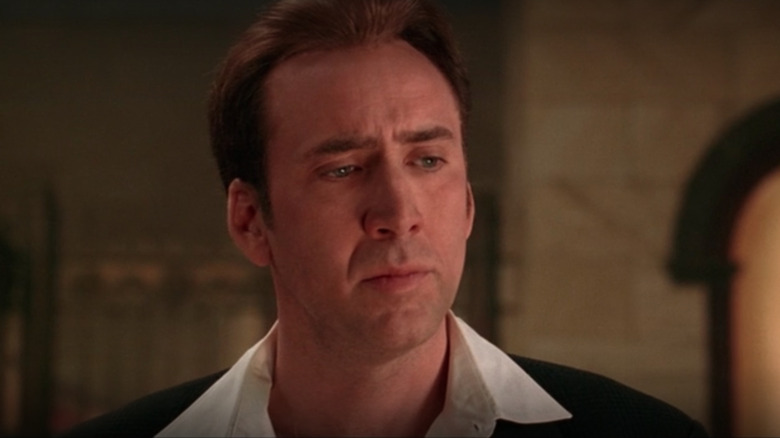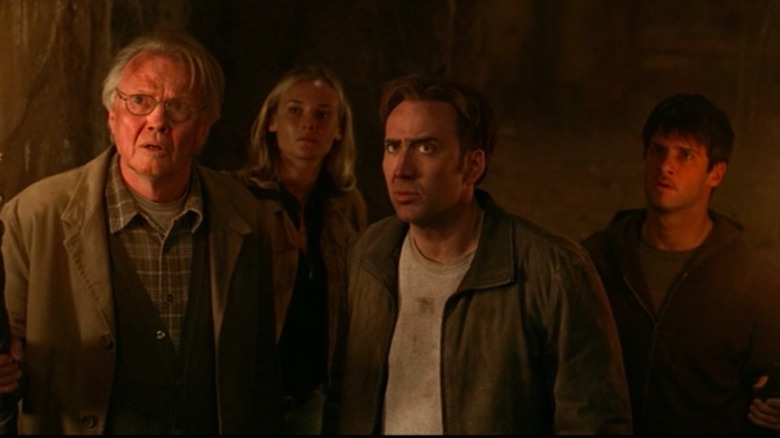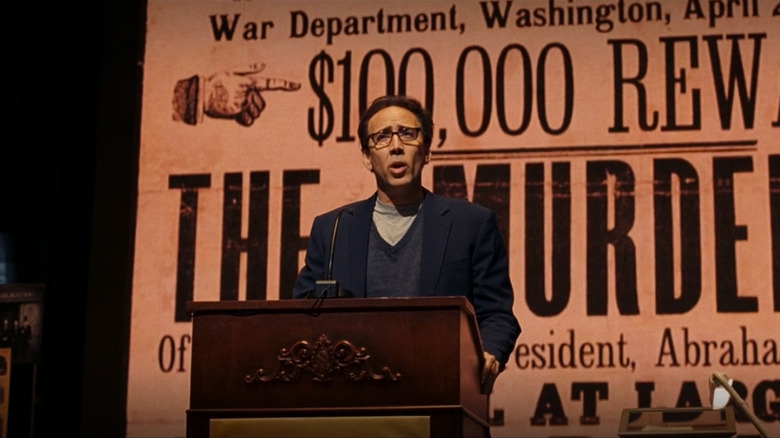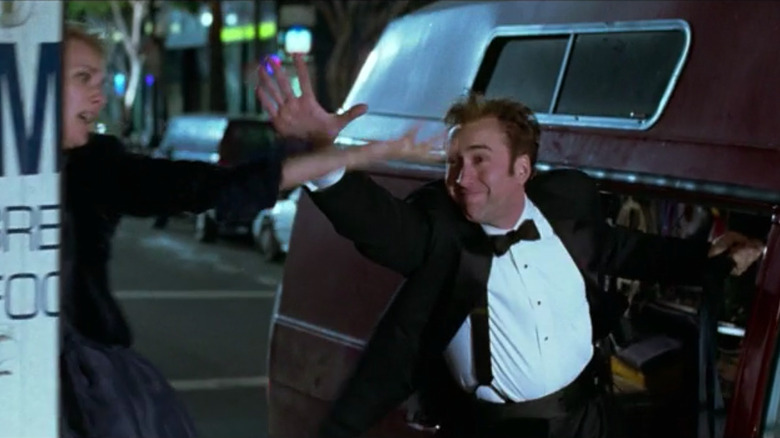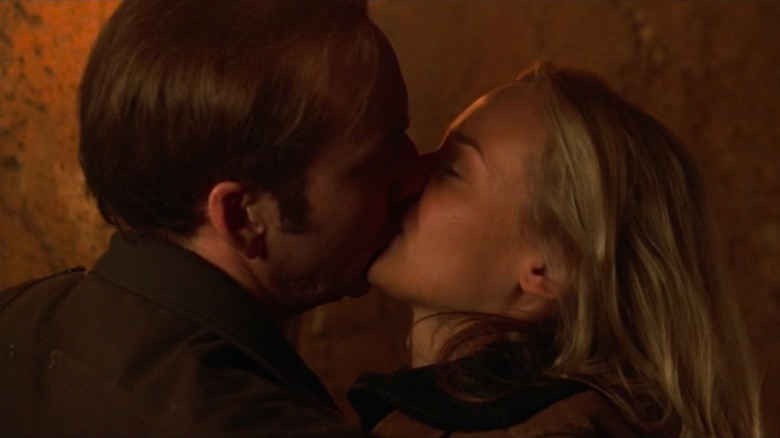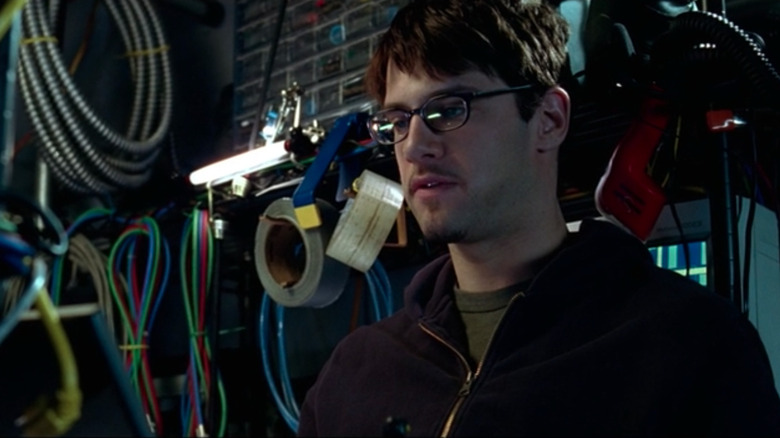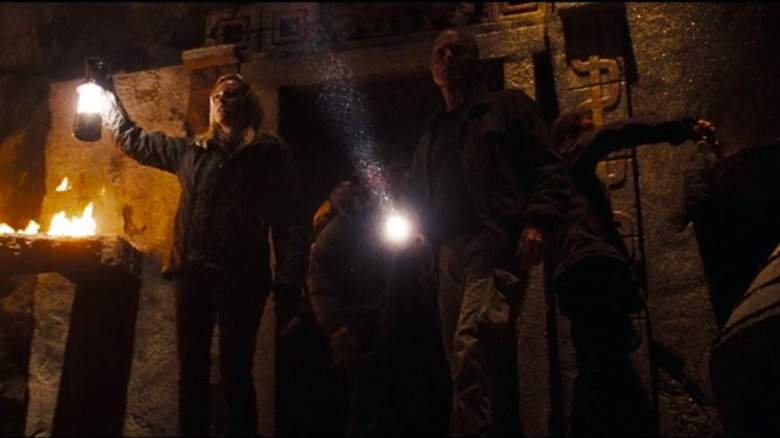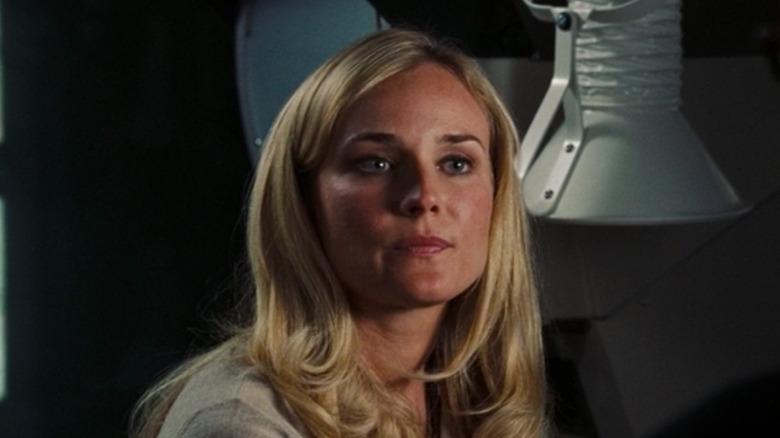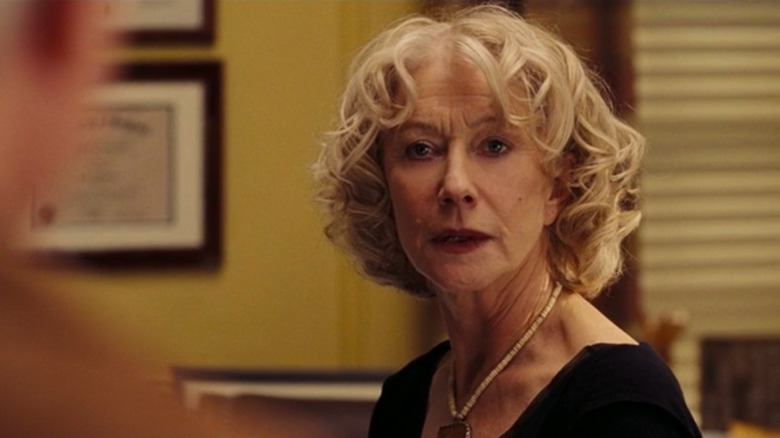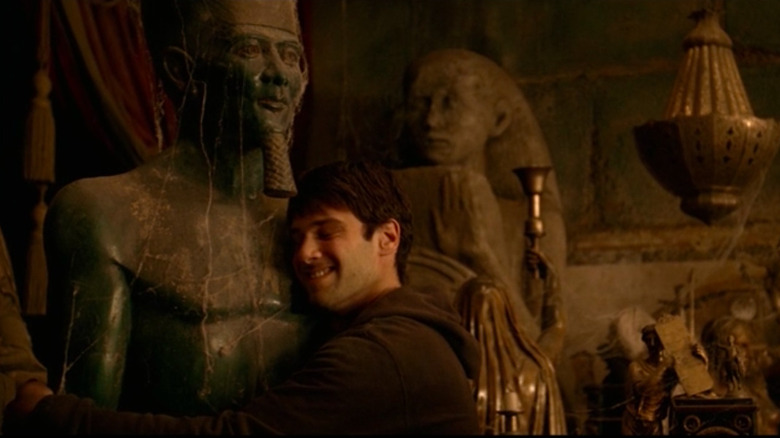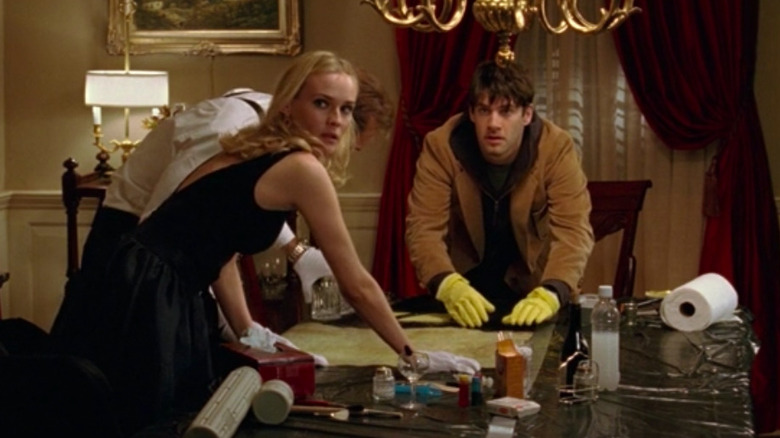The 7 Best And 7 Worst Things In The National Treasure Franchise
When the Jerry Bruckheimer-produced "National Treasure" premiered in 2004, critics felt it didn't exactly live up to its title (it still hovers at about 50 percent on Rotten Tomatoes). For audiences, however, it scratched an itch for treasure-hunting action, patriotic adventure, and pure popcorn entertainment largely unseen since the heyday of Indiana Jones. After the box-office success of that first film, audiences were just as eager for the sequel, "National Treasure: Book of Secrets."
Both movies focus on Nicolas Cage's aptly named Benjamin Franklin Gates, the latest in a long line of treasure hunters who've been searching for the treasure of the Knights Templar (one of Gates' ancestors received a clue that supposedly led to it). While most people, including Ben's father Patrick (Jon Voight), pass the idea off as a myth, Ben truly believes the treasure exists. But after he has a falling out with his wealthy benefactor Ian Howe (Sean Bean) while chasing down the prize, he and computer expert Riley Poole (Justin Bartha) team up with Dr. Abigail Chase (Diane Kruger) of the National Archives to reach the riches before Ian — an endeavor that requires them to steal the Declaration of Independence (a plot detail that has only helped boost the quirky Cage mystique).
Things only got zanier in "Book of Secrets," as the trio, along with Patrick and Ben's mother Emily (Helen Mirren), would find themselves on the hunt for Cibola, the lost Native American city of gold. It's an adventure that takes them from Paris to London and from the White House to Mount Rushmore — and requires Ben to kidnap the President ... because, of course it does. Despite the franchises' increasingly fantastical plot points, the flicks are a rollicking good time. Will there finally be a third? Cage continues to tease the possibility.
Below are the best, and worst, things in the "National Treasure" franchise — so far.
Best: The films are silly fun
The plots of "National Treasure" and its sequel can get awfully silly, but they're a whole lot of fun. It's hard to imagine many writers hanging a movie's plot on stealing the Declaration of Independence (or kidnapping the President of the United States), but the franchise doesn't just go there, it does it with such gusto it's hard not to get swept up in Ben's conviction that he's doing the right thing... for America!
Yet, even though director Jon Turteltaub's approach to the material is surprisingly serious — with the occasional knowing wink. This is especially true of the scene in the first film where Ben and Riley attempt to convince an extremely skeptical Abigail that Ian is planning to steal the Declaration of Independence because there's an invisible map on the back.
At the same time, the films revel in American history, architecture, and artifacts, making scenes involving the discovery of historical doodads and the revelation of historical minutiae every bit as exciting as its action sequences. Plus, with a PG rating and consistently low body count ("National Treasure" is a rare tale where Sean Bean's character doesn't die), the franchise is entertainment for the whole family.
Worst: The plots of the movies are absurd
Of course, movies only work if viewers embrace their plots, and the premise of both "National Treasure" movies are so absurd, it can be a challenge to enjoy the ride without eye rolling at every new, ludicrous development. After all, the movies go out of their way to insist on their patriotic leanings while celebrating a guy the audience is supposed to believe is both brilliant and uses faulty logic to arrive at the conclusion that the only way to stop someone else from stealing the Declaration of Independence is to do it himself.
Even from the very first moments of the first film, the premise can't avoid showing holes, explaining that somehow the Freemasons managed to hide an enormous treasure where no one could find it — then developed a series of clues to lead a lucky someone to it. This set-up leaves viewers to wonder how the Freemasons could have hidden such a big prize without attracting attention, and why they would spend time creating a treasure hunt to get to it that any random guy with the right information could embark upon.
By the time Ben has found a pipe containing an encoded message, then used his own blood to smear the clue onto a piece of paper, some viewers may be ready to tap out. If that's not the case, things only get more bonkers from there, practically making the films a litmus test for how much disbelief you'll suspend.
Best: It stars Nicolas Cage
One of the key reasons "National Treasure" and its sequel are so well-remembered is Nicolas Cage. While his character may not be as effortlessly cool and stolid as fellow movie treasure hunters Indiana Jones and Lara Croft, Cage imbues Ben with eccentric, unapologetic enthusiasm for historical discovery and unraveling clues , and that joy is infectious. In fact, even when things get particularly silly, Cage plays Ben with such earnest intensity the audience still roots for him.
Cage manages to make lines like "I'm gonna steal the Declaration of Independence" feel like noble statements of purpose, so single-mindedly devoted to his goal that viewers want to see if he's going to do to pull it off.
Cage manages to make you believe he's the smartest person in every room and when no one believes his wacky theories it is everyone else's problem, not his. By the time he gets a little looser and funnier in "Book of Secrets," the character's treasure hunting bona fides have been validated to the point where it feels like he's earned the right to periodically let his freak flag fly. It's an impressive tight-rope walk of a performance, and it's hard to imagine anyone but Cage pulling it off.
Worst: It stars Nicolas Cage
Cage is one of the main reasons the "Treasure" films work, but he's also one of the main reasons many people don't take the movie or its follow-up seriously.
A talented actor since he first arrived on the scene in the '80s, by the time the first "National Treasure" movie arrived, it had been quite some time after his Oscar-winning role in "Leaving Las Vegas." Cage had always been a captivating presence who made intriguing films like "Raising Arizona," "Moonstruck" and "Wild at Heart," but the decade leading up to "Treasure" had been stuffed with wannabe-action-hero auditions like "The Rock" and "Gone in 60 Seconds," quickly forgotten fare like "Kiss of Death," "The Family Man" and his "Wings of Desire" remake "City of Angels," and only occasionally punctuated by the sort of riskier fare — "Adaptation," really — that he spent much of the '80s embracing. Perhaps not coincidentally, this is also around the same time Cage gained a reputation for buying things like castles, dinosaur skulls, an octopus and expensive comic books, feeding rumors of a messy personal life and tendency to overspend then indiscriminately take on roles to pay for it all.
For better or worse, 2007's "Book of Secrets" would seemingly conclude a chapter of Cage's career. The would-be popcorn films ("Knowing," "Kick-Ass," "The Sorcerer's Apprentice") never attracted crowds the same size, the duds ("Season of the Witch," "Drive Angry") chipped away at his commercial appeal, and since 2013 his films have rarely received a sizable theatrical release. But this has freed Cage up to become a VOD darling, choosing some strange roles ("Mandy," "Willy's Wonderland," "Pig," "The Unbearable Weight of Massive Talent" that have taken once-derided overacting in bombs like the 2006 "Wicker Man" remake and turned it around so he's laughing alongside the viewers. The man became a walking meme, with his every move taken out of context and used to demonstrate a walking cartoon character with random clips ranging from "Vampire's Kiss" to "Bad Lieutenant: Port of Call New Orleans."
In some ways, this period of Cage's career may have hurt the credibility of the "National Treasure" films. In others, they set him up for a Cage renaissance, which he continues to ride today.
Best: It's got a great cast
While Cage is the name most closely associated with the "National Treasure" franchise, the movies surround him with an impressive stable of supporting heavyweights. In addition to Cage, the core cast of both films includes Diane Kruger, Justin Bartha, Jon Voight (Oscar winner), and Harvey Keitel (Oscar nominee) as a dogged FBI agent. If that's not enough for you, the two films also bring along Ed Harris (Oscar winner), Christopher Plummer (Oscar winner), Helen Mirren (Oscar winner), Bruce Greenwood, Ty Burrell (2 time Emmy winner) and Sean Bean.
Each of these stars has a moment to shine, whether it's Bartha quipping away as he follows Ben into some extremely questionable scenarios, Kruger matching Ben's enthusiasm for history, or Greenwood as the president. Voight turns in an endearing performance as Ben's skeptical father.
Both movies boast ace actors in the role of the villain, with Bean as the amiable but ruthless Ian Howe in "National Treasure" and Harris as black market dealer Mitch Wilkinson in "Book of Secrets." Their performances ensure that characters who could have been one-note black hats come across as more complex individuals.
Of particular note is the "National Treasure" appearance by Plummer as Ben's grandfather. Plummer's character introduces his grandson to the Gates family's treasure-hunting legacy in such a charming way in the prologue of the first film that viewers may find themselves wanting to believe his story too. Plus, "Book of Secrets" has Mirren as Ben's mother Emily, an expert in Native American languages, who can't stand Patrick, her ex-husband. There isn't a weak link in the bunch, and such strong acting makes the franchise all the more enjoyable.
Worst: The American History it presents isn't always accurate
The puzzles driving the "National Treasure" franchise are rooted in American history. While no one should rely on these movies to learn about the topic, there are numerous facts the movies get right. For example, several of the Founding Fathers (George Washington, Benjamin Franklin, and Paul Revere to be specific) were indeed Masons. Similarly, "Book of Secrets" revolves around a secret society that operated during the Civil War called the Knights of the Golden Circle, who really did exist.
On the other hand, the movies take numerous liberties with dates and details. For example, while Charles Carroll was the Mason who passed the clue to the treasure of the Knights Templar to an ancestor of the Gates family in "National Treasure," Carroll couldn't have been a Mason in real life because he was a Catholic — and the Catholic Church didn't allow its members to join the Masons. Similarly, although the Knights of the Golden Circle from "Book of Secrets" existed and Abraham Lincoln's assassin John Wilkes Booth was allegedly a member, the group disbanded before the end of the Civil War — and, therefore, had nothing to do with Lincoln's assassination.
Best: It features exciting action
Within a few moments of its open, "National Treasure" breaks into a rip-roaring action scene involving a very large explosion on a very old ship. Such sequences only become more eye-popping from there, and include everything from Ben attempting to rescue Abigail as she hangs on for dear life from the open door of a moving food truck to a sequence in which Ben, Patrick, Riley, Abigail, and Ian all do their best to survive a secret chamber's crumbling platforms.
The action in "Book of Secrets" features intense gunplay in its opening moments, as a Gates ancestor loses his life in 1865, mere days after the end of the Civil War. Then, in the present day, the characters are involved in everything from car chases through the streets of London to a water-logged escape from an ancient chamber full of treasure. Each of these action sequences is unique and creative in its own way, making for an exhilarating journey, even if you couldn't care less about all the historical mumbo-jumbo.
Worst: Its love stories are perfunctory
If there's one thing viewers know from watching action movies revolving around male heroes, it's that if a pretty girl plays a role, she and the hero are going to get together. So it's not exactly a surprise when Ben and Abigail hook up by the end of "National Treasure." Similarly, if there's one thing viewers know from rom-coms, it's if a man and a woman hate each other, it means they're going to fall in love. So, it's not much of a shock when Ben's divorced mom and dad's overwhelming hatred for one another evolves back into love — or that the bitter, broken-up Ben and Abigail agree to give it another shot by the end of "Book of Shadows."
Viewers expect such love stories to happen, and so the "Treasure" films oblige by going through the motions. But there isn't much heavy lifting here.
Neither Abigail and Ben, nor Ben's parents, have much spark. Sure, they argue with passion, but they have minimal romantic chemistry. So, while the high-intensity of treasure hunting might lead them to kiss at an inopportune moment, their attraction to one another is so superficial that it defies logic either of these couples could (or should) make a relationship work. It's like the writers felt the movies had to include some romance, but were too excited by all the treasure hunting to give the love stories anything more than their cursory attention, so everyone yawned out a few scenes while resting their muscles between stunts.
Best: It's like Mission: Impossible meets Indiana Jones
Outside of superhero blockbusters, there have been few movie franchises that have enjoyed more enduring popularity than the "Indiana Jones" films and the "Mission: Impossible" series. There's no more beloved movie treasure hunter than Harrison Ford's Indy, and Tom Cruise's Ethan Hunt and his team are always solving intricate mysteries of world-wide importance with the latest tech gadgets, the odd disguise or two, and Ethan's willingness to spring into action no matter what the circumstances.
When the original "National Treasure" film hit theaters, Cruise had only made two "Mission: Impossible" films. Nevertheless, the blueprint had been laid out, and the "Treasure" franchise was eager to Xerox it.
The first film can roughly be divided into a "Mission: Impossible"-like first half, in which Ben and Riley hatch an intricate plan that relies on Riley's tech expertise — and in the case of the plot to steal the Declaration of Independence, a laser — and an "Indiana Jones"-esque second half, in which the team ventures into antique structures and tries to survive. This combination enables it to leap from cutting edge tech to priceless artifacts of a bygone era without skipping a beat, creating a satisfying combination for fans of both of the franchises "National Treasure" borrows from so heavily.
Worst: It's derivative of other, better franchises
While such a mash-up of "Indiana Jones" and "Mission: Impossible" can be fun, it's also remarkably derivative; looking back now, there are many similarities between "Treasure" and "Tomb Raider" and "The DaVinci Code" and many more franchises. Where the "Treasure" films separate themselves, perhaps, is by being the kookiest.
In fact, had things been pushed just a little further, it could be a satire. Instead, they frequently feel like harmless filler for audiences wishing they were watching an "Indiana Jones" film.
The first "National Treasure," in particular, seems to simply lift pieces of other franchises and insert them into its story. The bickering relationship between Ben and his dad is reminiscent of the bickering relationship between Indy and his dad (Sean Connery) in "Indiana Jones and the Last Crusade." In addition, the montage where Riley and Ben prepare to steal the Declaration of Independence is straight out of a preparation montage in a "Mission: Impossible" film. In general, however, the other franchises "National Treasure" steals from are better-plotted and executed action-adventure vehicles. "National Treasure," perhaps, simply hasn't established as strong an individual identity.
Best: Diane Kruger's character is every bit as smart and intrepid as Nicolas Cage's
From the beginning of "National Treasure," it's established that although Ben works with intelligent people, including Riley, when it comes to encyclopedic knowledge of American history, no one can match him. Kruger's Abigail becomes the exception to that rule. Not only is Abigail as fascinated by obscure Americana as Ben, she's every bit as smart, educated, and well-informed.
Through the course of the movie, she also proves that despite her desk job at the National Archives, she can be just as bold and adventurous; just like Ben, her interest seems to have far more to do with the thrill of discovery than collecting a shiny prize. In fact, the pair are so aligned in their thinking that when Ben has to choose between saving Abigail or the Declaration of Independence and goes for the Declaration, Abigail later waves away his apology, confessing she would have done the same.
Clearly, this is a woman who maintains the courage of her convictions, no matter how extreme the situation. In the "National Treasure" franchise, Abigail is Ben's equal in pretty much every way.
Worst: There are only two major female characters and no major non-white characters
One gaping hole in the "Treasure" films is its lack of diversity.
Such issues may not have been as prevalent in 2004, but in any era, giving viewers something to look at other than a sea of white men is more interesting, if not more forward-thinking. After all, anyone can be an American history buff; anyone can be a treasure hunter. Characters in a film like this are essentially avatars, and it's easier for massive swaths of potential viewers to imagine themselves running down hallways and dodging bullets if the characters look somewhat like them.
While Abigail is a primary character in both movies, Kruger is reduced to eye candy at times; in other scenes she's essentially Smurfette, the only woman in a sea of men. The second film doubles its number of women characters by introducing Mirren's Emily — a strong, intelligent addition — but it's debatable whether "Book of Secrets" passes the Bechdel test, because Abigail and Emily barely talk to one another.
When it comes to people of color, the franchise does even worse. All the major characters in both films are white. In fact, outside of the clerk at the National Archives gift shop, an FBI agent in "National Treasure" and the expert Mitch takes one of the clues to in "Book of Secrets," very few people of color are seen and even fewer speak. It's a depressing reality of the world of "National Treasure" that seems like a missed opportunity to create a film that actually looks like modern America, not the one from the Declaration of Independence days.
Best: It includes some hilarious moments
As seriously as both "National Treasure" films take their respective treasure hunts, the movies still manage to be pretty funny. Some of this is a product of the absurdity of the script. When Ben somberly declares he's going to steal the Declaration of Independence in the first movie and kidnap the POTUS in the second, it's hard to not giggle.
Bartha amplifies this with his own comic relief, amplified in the sequel. Between his deadpan delivery and sly observations, his presence throughout the films keeps things light and entertaining. Plus, he and Cage make a great team. When RIley and Ben first meet Abigail, Riley's running commentary as Ben explains their surreal mission not only explains all of Washington D.C.'s response to the pair, it's also incredibly amusing.
Then, of course, there's Cage himself. He's more obviously funny in "Book of Secrets," where the script calls for him to stage a wacky, very public fight with Abigail, but while he's less showy in "National Treasure," his unexpected responses and expressive delivery ensure many of the movie's moments are laced with humor, whether he's talking to himself as he attempts to puzzle out a clue or is attempting to explain what's happening to an extremely agitated Abigail.
Worst: It's predictable
The "National Treasure" franchise has never gone out of its way to put a new spin on adventure films. The series' most noteworthy contribution to the genre, perhaps, is its use of American history (as opposed to the history of some other part of the globe) as a jumping off point for its story. But when it comes to the plot, the movies rely on well-worn cliches and familiar beats to keep the action moving. The movies reference everything from heist thrillers to treasure-hunting adventures to mystery stories, yet "National Treasure" and its sequel rarely attempt to innovate.
As a result, audiences frequently know exactly when to expect the next action beat, when a new clue is likely to be uncovered, and when a major discovery will happen. Viewers also know that, in the end, Ben and his allies will find what they're looking for and win the day. For some viewers, this may be reassuring — comfort food in the guise of entertainment — but for others, the lack of unexpected turns are disappointing.
As with all things "National Treasure," as long as you know what you're signing up for, you might find the good outweighs the bad.
